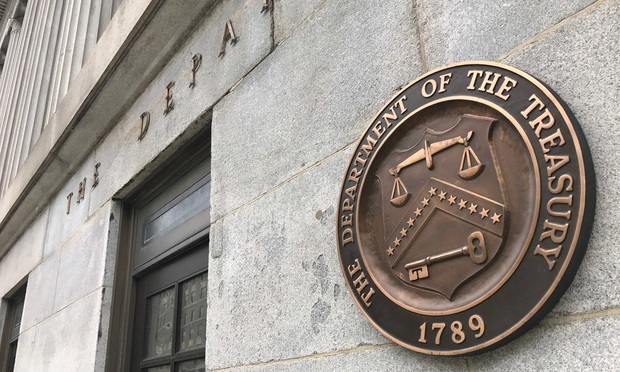Anonymous Treasury Department YouTuber Seeks to Block Government Request for Data
The self-described whistleblower asked a federal judge in Northern California to block a subpoena from Treasury's Inspector General's Office seeking to identify who posted a pair of YouTube videos criticizing the minority hiring and promotion practices of the Office of Financial Research.
March 28, 2018 at 05:54 PM
3 minute read

An anonymous Treasury Department employee has asked a federal judge in Northern California to block a government request for information from Google that could reveal his or her identity.
The Treasury Department's Inspector General's Office earlier this year subpoenaed Google for records related to two YouTube videos consisting primarily of text, which the anonymous employee claims to have posted. The videos assert that officials at the Office of Financial Research, or OFR, the Treasury unit created in the wake of the 2008 financial crisis to help forecast and anticipate financial storms, discriminated against minorities in hiring, pay and promotion, particularly African-Americans.
San Francisco's Kronenberger Rosenfeld filed a motion to quash the subpoena on Tuesday. The firm argues that their client, a current Treasury employee referred to simply as “Doe” or “Movant” in court documents, is a whistleblower whose rights are protected by the First Amendment and various statutes protecting government employees who report misconduct. The motion claims Doe raised issues such as age and race discrimination anonymously through internal Treasury Department channels, as well as to the EEOC, the Office of Special Counsel, and 15 members of Congress.
In lieu of an order fully blocking the subpoena, Doe's lawyers asked alternatively for a protective order shielding their client's identity from anyone besides “specified, responsible individuals” within the Inspector General's Office.
“While Movant may possess relevant information that Movant is willing to share to assist OIG in any legitimate investigation, Movant has genuine concerns that the disclosure of Movant's identity will result in retaliation, including the loss of Movant's employment,” Doe's lawyers wrote. Doe's lawyers also claim that while the Inspector General's Office is authorized to issue subpoenas as part of its role in investigating fraud and abuse at Treasury, the investigation here appears “to be pretext to identify Movant and retaliate.”
The Treasury Department deferred a request for comment to the Office of Inspector General. A spokesman for the office said in an email Wednesday afternoon it had been made aware of “potentially threatening situations at OFR.”
“We are responsible for investigating threats to the integrity of Treasury programs. Accordingly we are looking into potential threats. We cannot discuss further at this time,” the spokesman said.
Jeffrey Rosenfeld, one of Doe's lawyers, said that his client suspects that efforts to ferret out the YouTube poster's identity are likely tied to efforts from OFR officials to identify and punish anonymous sources in a recent Wall Street Journal article critical of the office's work. But, Rosenfeld pointed out, the partially redacted copy of the subpoena his client received from Google offers little insight to what the inspector general is investigating.
“We're a little surprised at the secretive nature of this subpoena. Our client has been complaining for a while and is willing to cooperate with any legitimate investigation,” Rosenfeld said. “We just don't think this effort is bona fide.”
This content has been archived. It is available through our partners, LexisNexis® and Bloomberg Law.
To view this content, please continue to their sites.
Not a Lexis Subscriber?
Subscribe Now
Not a Bloomberg Law Subscriber?
Subscribe Now
NOT FOR REPRINT
© 2025 ALM Global, LLC, All Rights Reserved. Request academic re-use from www.copyright.com. All other uses, submit a request to [email protected]. For more information visit Asset & Logo Licensing.
You Might Like
View All
Meta agrees to pay $25 million to settle lawsuit from Trump after Jan. 6 suspension
4 minute read
How We Won It: Latham Secures Back-to-Back ITC Patent Wins for California Companies
6 minute read
Trending Stories
- 1Gunderson Dettmer Opens Atlanta Office With 3 Partners From Morris Manning
- 2Decision of the Day: Court Holds Accident with Post Driver Was 'Bizarre Occurrence,' Dismisses Action Brought Under Labor Law §240
- 3Judge Recommends Disbarment for Attorney Who Plotted to Hack Judge's Email, Phone
- 4Two Wilkinson Stekloff Associates Among Victims of DC Plane Crash
- 5Two More Victims Alleged in New Sean Combs Sex Trafficking Indictment
Who Got The Work
J. Brugh Lower of Gibbons has entered an appearance for industrial equipment supplier Devco Corporation in a pending trademark infringement lawsuit. The suit, accusing the defendant of selling knock-off Graco products, was filed Dec. 18 in New Jersey District Court by Rivkin Radler on behalf of Graco Inc. and Graco Minnesota. The case, assigned to U.S. District Judge Zahid N. Quraishi, is 3:24-cv-11294, Graco Inc. et al v. Devco Corporation.
Who Got The Work
Rebecca Maller-Stein and Kent A. Yalowitz of Arnold & Porter Kaye Scholer have entered their appearances for Hanaco Venture Capital and its executives, Lior Prosor and David Frankel, in a pending securities lawsuit. The action, filed on Dec. 24 in New York Southern District Court by Zell, Aron & Co. on behalf of Goldeneye Advisors, accuses the defendants of negligently and fraudulently managing the plaintiff's $1 million investment. The case, assigned to U.S. District Judge Vernon S. Broderick, is 1:24-cv-09918, Goldeneye Advisors, LLC v. Hanaco Venture Capital, Ltd. et al.
Who Got The Work
Attorneys from A&O Shearman has stepped in as defense counsel for Toronto-Dominion Bank and other defendants in a pending securities class action. The suit, filed Dec. 11 in New York Southern District Court by Bleichmar Fonti & Auld, accuses the defendants of concealing the bank's 'pervasive' deficiencies in regards to its compliance with the Bank Secrecy Act and the quality of its anti-money laundering controls. The case, assigned to U.S. District Judge Arun Subramanian, is 1:24-cv-09445, Gonzalez v. The Toronto-Dominion Bank et al.
Who Got The Work
Crown Castle International, a Pennsylvania company providing shared communications infrastructure, has turned to Luke D. Wolf of Gordon Rees Scully Mansukhani to fend off a pending breach-of-contract lawsuit. The court action, filed Nov. 25 in Michigan Eastern District Court by Hooper Hathaway PC on behalf of The Town Residences LLC, accuses Crown Castle of failing to transfer approximately $30,000 in utility payments from T-Mobile in breach of a roof-top lease and assignment agreement. The case, assigned to U.S. District Judge Susan K. Declercq, is 2:24-cv-13131, The Town Residences LLC v. T-Mobile US, Inc. et al.
Who Got The Work
Wilfred P. Coronato and Daniel M. Schwartz of McCarter & English have stepped in as defense counsel to Electrolux Home Products Inc. in a pending product liability lawsuit. The court action, filed Nov. 26 in New York Eastern District Court by Poulos Lopiccolo PC and Nagel Rice LLP on behalf of David Stern, alleges that the defendant's refrigerators’ drawers and shelving repeatedly break and fall apart within months after purchase. The case, assigned to U.S. District Judge Joan M. Azrack, is 2:24-cv-08204, Stern v. Electrolux Home Products, Inc.
Featured Firms
Law Offices of Gary Martin Hays & Associates, P.C.
(470) 294-1674
Law Offices of Mark E. Salomone
(857) 444-6468
Smith & Hassler
(713) 739-1250







